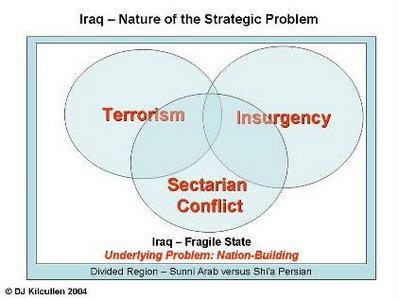
The “Four Problems” concept (Dave Kilcullen)
In essence, the model suggests that Iraq comprises four strategic problems:
* an underlying nation-building problem, resulting from the fact that Iraq is a weak and fragile state, and
* three overlapping security problems that sit “above” that underlying problem, and make it harder to get at it. The three problems are:
o Terrorism – that is, the presence of terrorist entities including (but not limited to) AQI who seek to exploit the situation in Iraq to further extremist or trans-national aims
o Insurgency – the (primarily Sunni) rebellion against the new post-Saddam order in Iraq, including rebellion against both the coalition presence and the new Iraqi government, and
o Communal Conflict – including sectarian conflict between Sunni and Shi’a elements, and ethnic conflict between Kurds, Arabs and other ethnic groups.
The Regional Dynamic
This whole “four-problem set” sits within a region that straddles a Sunni Arab world (Arabia and the Sunni parts of the Levant) and a Persian Shi’a world (primarily Iran, but also Iranian proxies and allies) with a long history of internal and intra-regional conflict and tension. As General Zinni remarked recently, in toppling Saddam we have created the first Shi’a Arab state in modern history, with profound implications for the long-standing regional dynamic, and the global relationship between Sunni and Shi’a Islam, that we are only just starting to appreciate.
No comments:
Post a Comment